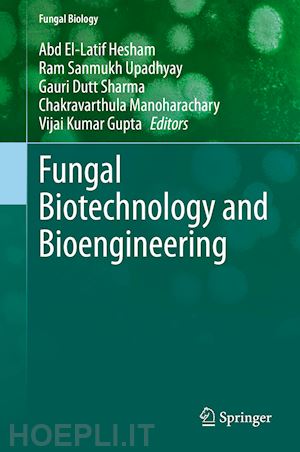
Questo prodotto usufruisce delle SPEDIZIONI GRATIS
selezionando l'opzione Corriere Veloce in fase di ordine.
Pagabile anche con Carta della cultura giovani e del merito, 18App Bonus Cultura e Carta del Docente
Fungi are eukaryotic microorganisms that include both unicellular and multicellular species. They have a worldwide distribution and a wide range of applications in diverse sectors, from environmental, food and medicine to biotechnological innovations. Fungal biochemical genetics involves the study of the relationships between genome, proteome and metabolome, and the underlying molecular processes in both native and bioengineered fungi.
This book provides a valuable resource on the challenges and potential of fungal biotechnology and related bioengineering and functional diversity for various industrial applications in the food, environmental, bioenergy and biorefining, and the biopharma sectors. In comparison to previous and related publications in the area of applied myco-biotech-engineering, this book bridges a knowledge gap in the areas related to prospects and investment as well as intellectual and technical issues. This book also provides information on recent commercial and economic interests in the area by juxtaposing the developments achieved in recent worldwide research and its many challenges.
Prof. Abd El-Latif Hesham, is full Professor of Microbial Genetics and Environmental Meta-Genome Biotechnology, and presently working as Head of Genetics Department, Faculty of Agriculture, Beni Suef University (BSU), Egypt. He graduated and got his M.Sc from Genetics department, Faculty of Agriculture, Assiut University, Egypt and his PhD degree from Research Center for Eco-Environmental Sciences, Chinese Academy of Sciences in "Microbial Genetics and Environmental Meta-Genome Biotechnology". He awarded postdoctoral studies about " Meta-Genome Biotechnology" from CAS-TWAS.
Before joining BSU he worked at Assiut University since his graduation in 1992 to July 2019 as a demonstrator, lecturer, assistant professor, associate professor and then full professor. He also worked as associate professor of microbial genetics and biotechnology for five years in the Department of Biology, Faculty of Science, King Khalid University, Saudi Arabia.
Heis one of the leading experts in the area of “Microbial Genetics & Biotechnology”, “Biodegradation, Bioremediation & Phytoremediation”, " Microbial community structure, “Soil Microbiology and Enzyme activities”, “Biological Control”, “Anti-microbial activates”, “Biofertilizer”, “Biofuels” and "Environmental Meta-Genome Biotechnology". He has co-authored more than 80 peer-reviewed publications in reputed Thomson Reuters impact factor journals and 4 book chapters in international reputed publishers like Elsevier, Springer-Nature, Taylor & Francis and John Wiley & Sons. He is key person in many national and international research projects related to field of Microbial Genetics and applied biotechnology.
Prof. Hesham has been the scientific & organizing committee member and invited speaker in various international conferences. He is also a recipient of several prestigious national and international awards including most recently he has been elected as member of the Egyptian National Biotechnology Network of Expertise (NBNE); and Has been appointed as the Country Representative for Egypt and the Arab Counties by International Biodeterioration & Biodegradation Society (IBBS) UK, which belongs to the Federation of European Microbiological Societies (FEMS).
He is also Fellow of Microbiology Society, UK; European Federation of Biotechnology, Spain; The Bio-Processing Network, Australia; and The International Biodeterioration & Biodegradation Society.
Prof. Hesham serves as an associate editor and editorial board member for international reputed journals such as, Scientific Reports; Frontiers in Microbiology; Frontiers in Plant Science; PeerJ; Current Bioinformatics; International Journal of Agriculture & Biology; Journal of Environmental Biology and Biocatalysis and Agricultural Biotechnology.
Professor Ram Sanmukh Upadhyay is a Professor and Head of Botany Department at the most prestigious University of India, Banaras Hindu University (BHU). He is credited with the discovery of the perfect state of Fusarium udum, the causal agent of the wilt of pigeon pea. He is also acclaimed for his contributions to the biology of this pathogen. He has published 143 research papers, 60 Book Chapters, 03 edited Books and 01 Monographs of national and international repute. He has produced 27 Ph.D. students ranging on the topics such as biological control of plant pathogens, programmed plant cell death in response to pathogens, bioremediation of toxic effluents, induced resistance in plants and their immunization, plant growth promoting microbes, chitinase production from actinomycetes, mycorrhizal technology for reclamation of wastelands, role rhizobacteria in detoxifying phytotoxic effect, development of molecular markers in tracking microbes in environment and effect of biotic and abiotic factors on plants, molecular basis of plant- microbe interaction. Six Ph. D. students are currently working under his supervision. He has supervised more than 60 MS/MD level dissertations. His current research interest focuses mainly on biological control of fungal plant pathogens, induced resistance in plants against pathogens, and microbial technology. He is a member of various scientific societies and is on the editorial board of various journals. Dr. Upadhyay is a recipient of the prestigious Young Scientist Award of the Indian National Science Academy (INSA), Professor L. S. S. Kumar Memorial Award of INSA. He was conferred by the Prime Minister of India with Prof. Hira Lal Chakravorty award of the Indian Science Congress Association in 1986. He has carried out collaborative research at Rothamsted Experimental Station (England; 1988-89) with Dr. David Hornby as visiting Fellow of the Royal Society of London., Illinois State University (USA; 1990-91) with Prof. R. K. Jayaswal, Distinguished Professor, and











Il sito utilizza cookie ed altri strumenti di tracciamento che raccolgono informazioni dal dispositivo dell’utente. Oltre ai cookie tecnici ed analitici aggregati, strettamente necessari per il funzionamento di questo sito web, previo consenso dell’utente possono essere installati cookie di profilazione e marketing e cookie dei social media. Cliccando su “Accetto tutti i cookie” saranno attivate tutte le categorie di cookie. Per accettare solo deterninate categorie di cookie, cliccare invece su “Impostazioni cookie”. Chiudendo il banner o continuando a navigare saranno installati solo cookie tecnici. Per maggiori dettagli, consultare la Cookie Policy.